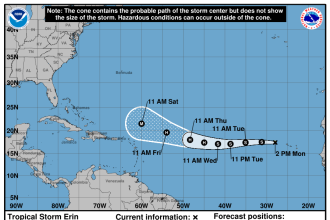The Board of Directors for St. Isidore of Seville Catholic Virtual School, along with Tulsa Bishop David Konderla, second left, and Oklahoma City Archbishop Paul Coakley, third left, meet June 28, 2024, at the Diocese of Tulsa’s Chancery Office in Broken Arrow. The archdiocese and diocese are now opening a private online school after St. Isidore of Seville failed to get approval from the U.S. Supreme Court. (Photo by Nuria Martinez-Keel/Oklahoma Voice)
OKLAHOMA CITY — After their pursuit of taxpayer school funding failed to get approval from the U.S. Supreme Court, Oklahoma Catholic leaders have canceled plans to open St. Isidore of Seville Catholic Virtual School and will open a private online academy instead.
The Archdiocese of Oklahoma City and the Diocese of Tulsa announced Monday the opening of St. Carlo Acutis Classical Academy in the 2026-27 school year. Named for a recently canonized millennial saint, the tuition-based virtual school will enroll up to 300 students statewide in kindergarten through eighth grade before adding a freshman class the following year.
Meanwhile, the website for St. Isidore of Seville virtual school, named for the patron saint of the internet, is no longer reachable. Archdiocese of Oklahoma City spokesperson John Helsley confirmed that plans to open St. Isidore have been discontinued.
A member of St. Isidore’s Board of Directors, Brett Farley, also verified the school will no longer open.
Catholic leaders will not seek state dollars for St. Carlo Acutis Classical Academy beyond a tax credit that assists private school students with tuition and fees, Farley and Helsley said.

Oklahoma City Archbishop Paul Coakley, left, and Brett Farley attend a Board of Directors meeting for St. Isidore of Seville Catholic Virtual School on June 28, 2024, at the Diocese of Tulsa’s Chancery Office in Broken Arrow. (Photo by Nuria Martinez-Keel/Oklahoma Voice)
The academy’s website shows St. Carlo Acutis will have the same governing board members who sat on St. Isidore’s Board of Directors, including Farley and other archdiocese officials.
The new school also will fulfill a primary goal intended for St. Isidore, which was to make Catholic schooling available to students in all parts of the state.
Many rural areas have no parish school, said Misty Smith, the academy’s head of school.
“One of the things we established through St. Isidore was that there’s (a) definite need to reach every corner of our state for good quality Catholic education,” Smith said. “And so, Carlo Acutis was one of the things that we decided we need to go with this. We need to actually provide this to the Catholic families and to really anybody who’s interested in it.”
Smith said the new academy will be a “better and different experience” than what students might have had at St. Isidore. Unlike the original virtual school concept, St. Carlo Acutis will have a classical school curriculum — a method of education often focusing on liberal arts, classic literature, and philosophy or theology.
Teachers will give live instruction online, and students will have opportunities for hands-on learning, Smith said. The school’s focus “will be nurturing the Christian development of each student” and providing guidelines for academic excellence within the context of the Catholic faith, the archdiocese has said.
The academy is already accredited, so families will be able to apply for Oklahoma’s parental choice tax credit right away, Smith said. Enrollment is expected to begin this winter.

Attorney Michael McGinley, flanked by officials from the Archdiocese of Oklahoma City, speaks outside the U.S. Supreme Court building after giving oral arguments on behalf of St. Isidore of Seville Catholic Virtual School on April 30 in Washington, D.C. (Photo by Nuria Martinez-Keel/Oklahoma Voice)
The fight to open St. Isidore of Seville as the nation’s first religious charter school started in 2023 with an application to the Oklahoma Statewide Virtual Charter School Board. Later that year, the board approved the school’s opening in a 3-2 vote that made national headlines.
Attorney General Gentner Drummond appealed the decision to the Oklahoma Supreme Court, contending the concept of a government-funded religious school “eviscerates” the constitutional separation of church and state. The state Supreme Court agreed with Drummond and blocked the school from opening.
Catholic leaders and the Statewide Charter School Board, which has since dropped the word “virtual” from its name, then asked the U.S. Supreme Court to take up the case. They contended charter schools are actually private entities contracted with the state and therefore should be free to adopt a religion.
The U.S. Supreme Court heard oral arguments for the case on April 30. The justices ultimately deadlocked at 4-4, with Justice Amy Coney Barrett recused.
That allowed the Oklahoma Supreme Court decision against the school to stand.
The new virtual academy will bear the name of the Catholic Church’s first millennial saint, Carlo Acutis, who was born in 1991 in London and raised in Italy. Pope Leo XIV canonized Acutis on Sunday.
Acutis died in 2006 at age 15 from leukemia. Tulsa Bishop David Konderla said Acutis created a website documenting Eucharistic miracles that “inspired and educated people around the world.”
“His life exemplified humility, piety, devotion, and discipline,” Konderla said in the school’s announcement. “His faith-filled life continues to inspire young people everywhere.”
SUBSCRIBE: GET THE MORNING HEADLINES DELIVERED TO YOUR INBOX








